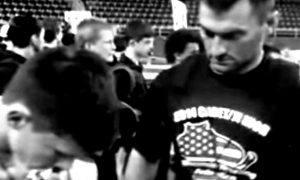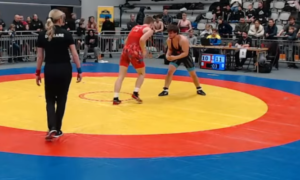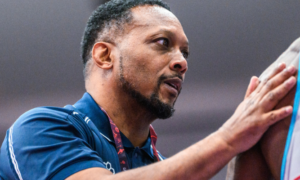One way or another, we pay admission for these things. Whenever you’re watching an event, there is an investment. Money or time, or both. There is no quarrel. Not really. Viewing Greco-Roman wrestling comes with expectations which are agreed upon beforehand, the mental negotiations sealed with imaginary handshakes. It’s often about a rooting interest, though one isn’t necessary, not if the action is good enough. Of course, sometimes it isn’t. Casual fans grow weary of the tightness, the arms and elbows intertwined into a mutual stalemate and the low-scoring bore-fests that have helped turn those same casuals into former viewers. Us hardcores just hope that eventually there is a throw or two that brings them right back. Some dynamic scoring always seems to be the catalyst for re-conversion.
That’s why we need Alec Ortiz.
A four-time state high school wrestling champion in his native Oregon, Ortiz went on to attend the University of Minnesota, one of the most storied collegiate programs in the country. Competing under legendary coach J Robinson, Ortiz enjoyed the full Golden Gopher experience, spending parts of five years in the wrestling room. He earned his letter and displayed flashes of success. But it wouldn’t be until he ascended to Senior Greco-Roman competition when Ortiz truly found himself.
Currently a contender on the national scene at 75 kilograms, Ortiz is one of those athletes who is a “must-watch.” That is how you’d say it. Life is short and cheating yourself out of six minutes of fun, in whatever form, is practically a mini-tragedy. Because to watch Ortiz is to bear witness to the kind of energy and moving parts which make any combat sport special. No, he doesn’t win ’em all. No one does. But he makes them count. It doesn’t make a difference who the opponent is or what the stakes are, there aren’t a whole lot of lulls when Ortiz is involved. He’s someone who chases breathlessness and if he is not getting enough cooperation from his opponent, so be it. He’ll force the circumstances until there is a reckoning and seriously, in this tightrope-walking era of Greco, an Ortiz scuffle is almost like a reaffirmation of faith.
But it is not on him to save the sport. Ortiz has a career and his own concerns to stare in the face. In two months, the Minnesota Storm wrestler will attempt to make the United States Greco-Roman World Team, a hearty challenge given the nature of the competition at his weight. From there, who knows? The recently-turned 27 year old is committed to training through the rest of this quad in effort to make the 2020 Olympic squad. Before then will be perhaps many other mettle-testing tournaments replete with triumphs and disappointments. That’s the job description. But through it all he will remain one of the country’s most significant gladiators, a man appreciated for his penchant for entertainment as much as his overall abilities. Nearly each performance worthy of applause. You’re happy to clap. You get your money’s worth.
5PM Interview with Alec Ortiz
5PM: Right now a bunch of US guys are overseas, including a couple of teammates of yours, and a large number of these athletes are wrestling this weekend in Denmark. Not to sound, but does this make you envious?
Alec Ortiz: I think if anything, envy would probably be the wrong word. I tend to not be a very jealous person so if anything, I would consider it motivating. I’m definitely happy for guys who get to go over there. I think we just sent Hayden Zillmer two days ago, Joe Rau I want to say is going to head there, too. And Barrett Stanghill is going to go over, as well, so I get excited that these guys get to go over. I look at it from a positive side for me, which now that there are four less guys in the room, I’m going to get some really good individual attention with the coaches that we have. I try to take the good aspect from it. Obviously, I would like the chance to get overseas sooner than later to get that kind of experience. When you’re trying to win World and Olympic medals you’re going to have to wrestle some foreigners, and the more chances I get to wrestle those guys and get a feel for their style, even going through the whole process like making weight overseas, cutting weight, training, what food are you going to eat, the whole process, the more times you can get over there and experience this, the more it is going to make you prepared for when it really counts.
5PM: Where do you think the biggest overall improvements in your game have been?
AO: My conditioning and getting the feel for Greco-Roman competition. I kind of had a little hiatus there for a couple years in college and so, I forgot what it felt like. The subtleties of pushing and pulling, not over-extending and not being overaggressive, something as simple as just keeping your elbows in so you don’t constantly give up underhooks, which I’m still battling with. But those are the things in which I am seeing the most improvement because I’m not falling over as much when I’m trying to pummel somebody or I’m not tripping over my own feet just trying to get a position to do a technique. I can feel that slowly starting to come back and even past where I was when I was doing Greco more frequently. So I would say, just to sum it up, that feel. Getting that Greco feel back and getting it to a point where I feel confident to go out and not have to just try and hit home runs but maybe, stay in position for a full match and have a good, solid position battle instead of needing that big throw to win. I can wrestle a little more basic, so those are some of the small improvements I’ve started to notice.
5PM: I’ve said it before, but you are pretty much never in a boring match. Is that something you are cognizant of in-match, that you like to make it exciting? Or does it just work out that way?
AO: I think it just works out that way. I think it can definitely be a disadvantage for me sometimes because I get…sometimes I think I get a little too anxious. If not enough is happening, it won’t be a conscious thought of, The fans are getting bored. But it just seems there is too much downtime. I’m not doing enough to make the action happen and I can get myself a little bit over-extended and a little bit out of position and you know, I do get thrown. It’s kind of a running joke in the room because I can be really good at being the crash test dummy (laughs). So when guys are learning how to throw or are trying to figure out, say, this bodylock, then it’s, Throw Ortiz, he’s good at landing. (Laughs) It’s a random skill to be good at and it’s not something I think a lot of people are good at.
But yeah, it’s not something I’m cognizant of, I have to make this match exciting, but I tend to end up there. Whatever it is in my brain that says, We have to make something happen, whatever it is, it’s not always to the best results but more often than not, I tend to get in those matches. It’s just what happens.
5PM: What is a day at practice like at Minnesota Storm for you?
Alec Ortiz: We usually warm up with some sort of a game, like soccer. We’ve done some ultimate frisbee-type stuff. And then drilling, whatever it is we’re working on at the time. Then a little bit of live wrestling, a little conditioning at the end. Definitely the tone of practice is (decided) by how the soccer game goes in terms of, clearly if nobody gets hurt, that’s the most important part. Coach (Dan) Chandler, Coach (Brandon) Paulson, Okay, is everybody ready, we’re going to play, no injuries, and that is repeated often because it’s the most important part. And when the game is over, Chandler will say, “Okay, no injuries, good job.” He doesn’t care about the score, but I don’t know, I think it gets practice started off the right foot. There are definitely days when we didn’t get a game in beforehand and enthusiasm for practice wasn’t quite the same. So yeah, that’s kind of the most important part almost (laughs).
I get back from practice and my wife is like, “So how was practice?” I go, “Well, we lost in soccer.” — “I didn’t ask about that, I asked how practice went.” — “Well, that’s part of it, you need to get started on the right foot otherwise the whole thing can be off.” And then she’ll ask, “Okay fine, so how was practice?”, and then we can talk about that part.
5PM: How tough is it to manage your off-the mat stuff, your business and coaching, along with being a full-time Greco athlete?
AO: I think college wrestling really got me prepared for that very well because we had such little time to do things. You had a morning workout, class, afternoon workout, and then homework, so much of your day was structured for you and I think it instilled a lot of good habits and reinforced habits that I felt worked really well in high school. So now it’s just inserting a different name over what I’m doing during the day. It’s not a required morning lift at 6:30 in Bierman Gym for the University of Minnesota, it’s, Hey, you’ve got to get a lift in today if you want to be competitive. So you need to get up and get to the gym so you can get to work on time.
It’s a little bit different but there is much the same. Instead of going to class all day, I go to work all day. I go to practice at the Minnesota Storm instead of the Gophers, and then homework is the night coaching or getting to relax at home with my wife. But yeah, I think high school and college really got me set up for that so it’s not new. It’s just a different version of that. So like time management in college, if you want to do something extra, you have to make the time for it. It’s up to you for that to happen. It isn’t terribly…I don’t want to say difficult, because no one likes getting up early, but I think you gain a certain amount of momentum doing it, it becomes second nature. Maybe there are some folks who say, Oh, I could never do that and get up a five o’clock in the morning. And I would just tell somebody, “Yeah, you can, you just have to do it a few times and get in the habit of it.” I’m in the habit of it now and it’s second nature.
5PM: Where do you see yourself in terms of your overall preparation for the Trials? Is there a peaking phase in your training?
AO: I like to think that I do a decent job of peaking. I don’t always know if that’s true. I think it’s one of those things you can convince yourself of, I’m doing this just right. I definitely feel better this time for this tournament than I did last year. We definitely taper a little but towards the end. We get more technical things in, not as much beating each other up, and just sharpening up technique, maybe a little mat strategy, weight management, of course. But I think the largest part of it is making sure you’re in the right place mentally to perform at your best. Obviously, you want to be in as good of shape as you can be physically, but the mental side is really where a lot of matches are won and lost and to keep that sharp is just as important, if not more so.

Ortiz (red) throws Colin Schubert (NMU-OTS) at the 2017 Dave Schultz Memorial. It’s easy to notice those socks. (Photo: Anne Sachs)
5PM: Please explain for those who don’t know what the deal is about your socks and kneepads.
Alec Ortiz: (Laughs) So the beginning of that was the Western Regionals, I must have been like 11 or 12 years old. Of course the most important part of that was getting the gear, what the gear looked like and what was included. And this one year we got knee-high socks that said “Team Oregon.” Everyone across the board hated them, myself included. I said, “These are awful, I don’t like these at all.” And for the first couple of times that wore them I tried to like, fold them down so that they would maybe look mid-calf, but they were just so enormous. And for some reason they just kind of started growing on me and I was taking everybody else’s Team Oregon socks. Oh, you like these Alec? Take them, because they suck and I’m never going to wear them. It was just a happenstance thing.
I’ve worn kneepads since I started wrestling. I don’t know, I just always liked it. I wasn’t the best athlete so I probably hit the mat a little harder than some guys did. Some of it was aesthetic and some of it was definitely safety for me as a younger person (laughs). And just like anything else, it became a habit. So then I had the knee-high Team Oregon socks and once I got into high school I thought, Okay, Team Oregon, but since I’m wrestling for the Willamina Bulldogs, I should probably get some Bulldog socks. I think I ended up getting cheerleading socks because they were the ones stylistically that were the most like what I wanted. They went over the knee and to the thigh. I have the Willamina Bulldog ones. I also have a Victoria’s Secret pair. They are like a pink brand that my cousin traded me because she wanted my Bulldog socks. So since my cousin gave them to me, my older cousin, I thought, Okay, I’ll only wear these on special occasions. They are the socks I’d wear in the finals.
When I transferred to Newberg, I remember I was like, Guys, I need Tiger socks. It was like I was talking about, momentum, just one of those things I had to keep going. My high school coach, Neil Russo, noticed my volleyball kneepads were falling apart in Fargo my sophomore year, so he bought me a white, Cliff Keen pair. I couldn’t just leave those alone so I did my best to tan-Sharpie the Oregon national team logo on them and those are the ones I still wear. Those are for competition only. Just like the socks. I don’t really practice in knee high socks, but it’s one of my mental cues that it’s game time, putting knee-high socks and kneepads on. It’s just one of those thing I’ve kept going. If I could get a pair of knee-high Storm socks, I’d be pretty excited, but I only have ankle socks for those right now.
5PM: I had to ask, just had to. Too noticeable.
AO: It doesn’t make any sense, it’s goofy (laughs). And I couldn’t do it in college, we had some uniform restrictions. Which, yes, of course, with J Robinson having been a military man I’m not going to battle him over socks, although I do have, what I wear most of the time now, the University of Minnesota socks. The “M” is on the foot, so it doesn’t do too much to advertise for the school, but they are maroon and gold on top. I remember asking, “Hey J, what about these?” He said, “No, that still won’t work.” So those are my usually go-to’s now, my Team Oregon pair is pretty stretched out, they don’t really fit anymore.
5PM: The Olympics are now three and a half years away just about. What is it going to take for you to make the team?
AO: Uh, let’s see here. Depending on where I get seeded at the Olympic Trials, what, five to seven matches? That is kind of how I have to look at it. That is the ultimate goal, to get there, to make the Olympic team and win a gold medal. That’s what we’re all going for.
I don’t think I 100% know. I know I have to be able to wrestle the best that I can and hopefully, it is better than everybody else on that day. I don’t think I know the secret to that one and if I knew, I don’t know if I’d want to tell anybody (laughs).
5PM: What is it that fans misunderstand the most about Greco?
Alec Ortiz: I think that they automatically perceive it as boring and they get weirded out by the fact that you can’t grab legs. Because in their mind, what else do you do? If they are folkstyle, maybe they wrestle freestyle, but Greco is the furthest down the line. You try to explain it to them. What? You can’t grab the legs, then how do you score? When you throw, how do you throw somebody…? It’s kind of a confusing aspect of how one scores points that is the biggest thing to it.


















